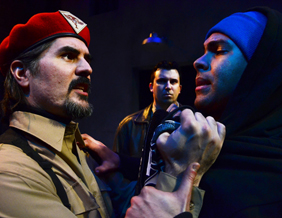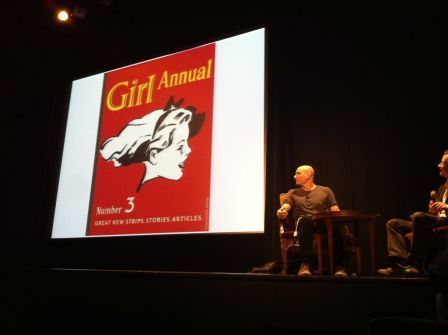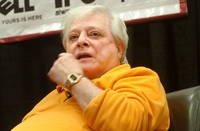That China Miéville’s The City and the City tied Paolo Bacigalupi’s The Windup Girl for the 2010 Best Novel Hugo surprised me. Maybe, like many fans, I’m prone to underestimate fantasy novels as Hugo contenders.
Bacigalupi’s SF novel had taken home every prize from the Nebula to the Compton Crook Award. It made Time magazine’s list of the Top 10 of Everything 2009. I expected it to win the Hugo by a landslide.
Now I’ve learned that hindsight is the only sight when it comes to Hugo handicapping. Other major awards may be poor predictors of Hugo success (see “The Unpredictable Best Novel Hugo”), still , they occasionally line up in the rear view mirror to make it seem as if picking against the favorite should have been the easiest thing in the world.
While The Windup Girl won the 2010 Locus Award for First Novel it finished far behind Cherie Priest’s Boneshaker in the SF Novel category. Meanwhile, Miéville’s The City and the City landed on top of the Fantasy Novel category. It was pretty clear that The Windup Girl would have serious competition for the Hugo.
The voters found these two novels indistinguishable in quality on Hugo night. Will they still seem so twenty years from now?
This is the third tie for the Best Novel Hugo in its history. Hindsight tells me it shouldn’t have happened the first two times.
In 1993 Doomsday Book by Connie Willis tied with A Fire Upon the Deep by Vernor Vinge.
It’s Doomsday Book Diana and I have given to friends we wanted to interest in science fiction. Connie Willis’ time travel adventure builds to a transcendent ending in which the efforts of an individual make a great deal of difference – not measured by how many lives are saved (a typical yardstick of stfnal heroism) but by the compassion shown to characters we care about in their hour of death, proving we do not all die alone.
Credit A Fire Upon the Deep with impressive ingredients: a richly inventive collection of aliens with unique psychologies, a new cosmology, a freshly imagined doom hanging over sentient life everywhere in the galaxy, and a set of mysterious histories that must be unraveled if anyone is to survive.
Three critical shortcomings hold it back.
First, Vinge never made me really care whether his characters won out, he merely made me curious about the final choices that he’d craft into the ending. When a story of children in jeopardy fails to jump-start a reader’s emotional connection to its characters, that’s a bad sign.
Second, Vinge initiated a romance between the two main adult human characters, then allowed it to fizzle for reasons that were valid in terms of their personalties and circumstances, facts that didn’t keep me from losing interest in their fates.
Third, the author uses a narrative scaffolding that turns this into SF’s only “e-mail punk” novel. Really, even in the early days of the internet when Vinge wrote this novel, were readers expected to believe the myriad alien races filling the galaxy in times to come would communicate with messages that look exactly as e-mail did in 1991? The small amount of intentional humor provided by strange sentient creatures writing like regulars on rec.arts.sf-lovers is swallowed by the vaster, unintentional humor of a future supposedly as limited as the primitive Internet.
At least in my view, history has broken the tie between Willis’s and Vinge’s novels.
Then, in 1966, Roger Zelazny was an author of one of the novels that tied for the Hugo, a story serialized as “…and Call Me Conrad” in The Magazine of Fantasy and Science Fiction in 1965. That it won an award under the circumstances is remarkable, having been substantially trimmed from the version later published in hardcover as This Immortal.
When Ted White was an assistant editor at F&SF it became his job to pare Zelazny’s manuscript to fit in the magazine. He spoke in his 1985 Worldcon guest of honor speech about his painstaking efforts, the guilt he felt every time he trimmed a word of Zelazny’s prose – and that after he turned in the manuscript editor Ed Ferman summarily cut another 5,000 words.
Even the full-length This Immortal feels slight compared with the best of Zelazny’s other award-winning novels such as Lord of Light, Jack of Shadows, and Isle of the Dead. Though it’s a good read This Immortal can’t withstand comparison with the novel it tied for the Hugo – Frank Herbert’s Dune, a canonical great work of science fiction.
Three times there has been a tie for the Best Novel Hugo. Hindsight tells me it shouldn’t have happened the first two times. What will the verdict be when another generation judges the Miéville and Bacigalupi novels?
 The stage production of City and the City, based on a China Miéville story, is in the midst of its run at Chicago’s Lifeline Theatre. It opened on February 15 and closes April 7.
The stage production of City and the City, based on a China Miéville story, is in the midst of its run at Chicago’s Lifeline Theatre. It opened on February 15 and closes April 7.


